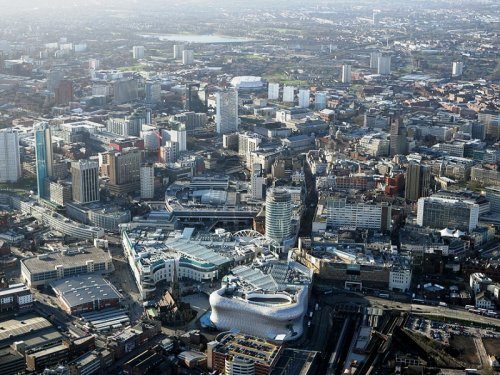Midlands cities close the growth gap on their southern rivals

Towns and cities in the Midlands are seeing strong jobs growth and are catching up on the historic top-performers in the south of England, according to a new report.
The latest Demos-PwC Good Growth for Cities Index concludes Birmingham is the most improved city in the UK compared with last year.
The report shows that while the highest ranked cities still tend to be mostly in the south of England, except for Edinburgh, the top 10 improvers in the 2017 index – aside from Birmingham – include Leicester, Wolverhampton & Walsall and Derby, suggesting that the Midlands is steadily narrowing the gap.
Only London and Southampton from the south are among the top 10 improvers relative to last year’s index. Other improving cities include Leeds, Newcastle and Liverpool.
The Good Growth for Cities index derives its results by factoring in work and general wellbeing as well as GDP. The index measures the performance of 42 of the UK’s largest cities, England’s Local Enterprise Partnerships (LEPs) and the new Combined Authorities against a basket of ten indicators based on the views of the public as to what is key to economic success and wellbeing.
These include employment, health, income and skills – the most important factors, as judged by the public – while housing affordability, commuting times, environmental factors and income inequality are also included, as is the number of new business starts.
Birmingham reached the top spot for most improved city, performing above average on new businesses per head, jobs, health transport and environment, while Leicester, Coventry, Wolverhampton and Walsall also enter the top 10 of the index.
The index shows that all 42 UK cities improved their score relative to the 2016 Index, driven primarily by increasing employment. In general, those cities that have seen the biggest improvements in their overall score have also experienced particularly large falls in unemployment in recent years.
However, while all 42 cities have improved their year-on-year scores in the 2017 index, success comes at a price. A reduction in housing affordability, falling owner occupation rates, rising average commuter times, and minor declines in both health and work-life balance since last year’s report suggest pressure on scarce resources such as housing, transport and labour during the recent period of economic recovery between 2013 and 2016.
Matthew Hammond, PwC’s Midlands regional chairman and Birmingham senior partner, said: “Delivering good growth cannot be achieved by any one person working alone, but goes hand-in-hand with place based transformation, where local government, central government and the private sector act together and work collaboratively, to facilitate local economic growth, prosperity and wellbeing. There is strong evidence that devolution is creating conditions for what appear to be quick wins, but are in fact long-term growth opportunities.”
The analysis of the English combined authority areas shows a strong performance in metro mayor cities. Three of the six newly elected mayors were elected into regions containing cities in the top 10 improvers in the index: Birmingham, Middlesbrough and Liverpool.
PwC said that while the election of mayors per se had no direct bearing on the index scores outcomes, the devolution process which created the cities and combined authorities has been a work-in-progress for a number of years and this has already had a positive effect on local performance and so the good growth index scores for these cities.
“We’ve seen broad-based improvements in our good growth index across the Midlands, driven in particular by falling unemployment rates. Some areas that had lagged behind in the recovery from the financial crisis are now showing clear improvements, so the recovery and some early signs of economic re-balancing are spreading across the UK and particularly in the same areas of the Midlands,” added Mr Hammond.
“However, we are also seeing the price of prosperity in terms of growing pressures on scarce resources of housing, transport and skills. If regional cities are to sustain the strong recovery and performance of recent years, it will be critical to address these challenges as part of cities’ growth strategies. Key national and regional infrastructure projects combined with private sector development, such as HS2, will add momentum to the Midlands for the next decade.”









